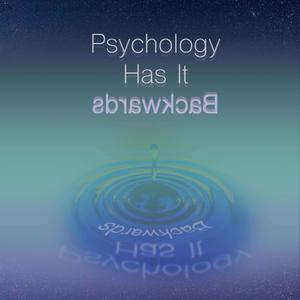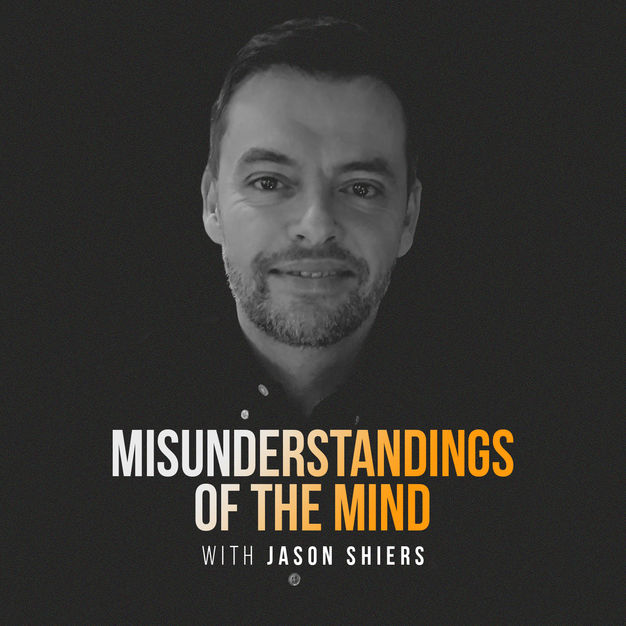
Psychology Has It Backwards
Christine Heath and Judy Sedgeman
We're offering mental health professionals a fresh look at the fundamental cause of stress and distress, and the fundamental source of cure. It's simpler than it has seemed, and the result is sustained mental well-being. Psychology has had it backwards.
- 33 minutes 23 secondsEpisode 182: The Illusion of Thought, Part 1
"Ego" is whatever we think about ourselves. Believing those thoughts can result in acting on idiotic ideas. Such thoughts are illusions we create about what we are or how we should be. Our thoughts appear real as we're thinking them, but they are no more than illusions we have created. There is no need to be frightened by illusions that will disappear as soon as we stop thinking them and turn our thoughts elsewhere. We all live in the same reality, but our experience of it is how and what we think it is, unique to us moment-to-moment. Recognizing ego-thoughts for what they are -- just fleeting images we are making up in our own minds -- helps us not to become discouraged or frightened by negative thoughts we have about ourselves, and not to become arrogant or boastful about positive thoughts we have about ourselves. We are all just human beings using the gift of the Principles to think our way through life. Because thoughts are illusions, images passing through our minds as we create them, we are not prisoners of our own thinking. We're always just a thought away from creating a different experience.
11 January 2025, 4:00 pm - 31 minutes 31 secondsEpisode 181: The Gift of Acceptance
People often think that the Principles explain why we are tempted to act on negative past thoughts when they come to mind. We try to assign blame, or rationalize that we were insecure at the time. We engage our intellect (our memories) to see how/why thinking and behaviors we wanted to put behind us came back. We find ways to use the Principles to sidestep accountability and acceptance of what is. We miss the possibility of going deeper and learning from fresh insight. Yes, thought creates our experience; but when we are thinking a reality that we don't want, our true gift is we can let any thought go. Our true guide is the feeling state that comes with thoughts. If something occurs to us that gives us an uneasy, negative feeling, we know to stop; slow down, remember we are the thinkers and we have the power to take thoughts seriously or let them go. The experience thought creates is a feeling state; that is what guides us to know whether our thoughts are helpful, constructive, inspiring, or not worth keeping in mind. Every moment is a fresh start.
4 January 2025, 4:00 pm - 38 minutes 27 secondsEpisode 180: Accountability and Change vs. Intellectual Understanding
It's true that the only "reality" we experience is created by our thoughts. But it's not an excuse for acting on any and every thought we have. We've heard people who have exposure to the Principles say things like, "Yes, I probably shouldn't have done that. But when it came to mind, it was so real and compelling to me." We can't forget we have free will to act or not to act on any thought that comes to mind, and we have wisdom to guide us towards or away from our thinking moment-to-moment. It's important in the understanding of how the Principles work to see deeper than "our thinking becomes our reality." That alone bypasses the fact that if the reality we're experiencing creates bad feelings, or doubts, or compelling but uncomfortable ideas that might be hurtful to ourselves or others, we can let those thoughts go and see the feelings they're creating as information that tells us we need to quiet down and wait for a clearer head and wiser ideas to come to mind. Our feelings are a navigational system that guides us to turn away from low mood negative thinking and use our intuition (common sense, judgment) to make choices about thoughts to ignore and thoughts to follow.
7 December 2024, 4:00 pm - 32 minutes 19 secondsEpisode 179: How Do We Know When We're Accessing Wisdom?
Many people struggle with decisions. What to do, what to do? The usual approach is to mull it over; consider all the options, think carefully, solicit a lot of information. Our tendency is to engage our intellect in analysis of pros and cons, advice and considerations. This kind of thinking is exhausting and frustrating. For every pro, we can think of a con. There are always new ways to look at an issue. We easily forget to depend on the gift we have for natural insight and clarity: a quiet mind and confidence that from that state of mind, we'll get the answer we need. We'll "know" and the answer will be obvious. When we trust our innate wisdom, the experience of decision-making is simple. We approach life with a clear head and recognize common sense when it occurs to us. Experience with quieting down and waiting for inspiration when we face new challenges teaches us that answers will always come to us, and the feeling of certainty we get when they do assures us that they are right for us. We all have what our colleague Christa Campsall calls "our guide inside" — the ability to listen for our own wisdom.
23 November 2024, 4:00 pm - 33 minutes 49 secondsEpisode 178: Sadness Without Suffering
People sometimes assume that if they really "saw" the Principles, they would always be happy. The truth is, understanding the Principles that describe how we create experience does not lead to any particular emotional outcome; it simply leads us to accept the rollercoaster of life's ups and downs and the range of emotions we feel as they occur as natural and ever-changing. We do not need to think ourselves into reaction to our own states of mind and responses to life events. We don't need to "pretend" to be unaffected by negative events. We ride the waves without worrying about them. So, even when we are having negative feelings, we don't get frightened by them, or worried that they will never pass, or concerned that people will judge us. Life, as Sydney Banks told us, is "a contact sport." We're meant to take part and experience the thrills, the spills, the wins and the losses, the hurt and the joy as grateful participants in the experience of being a human being. It's not necessary to fight our feelings when we don't enjoy them; they will pass as life continues to unfold. Pain is pain; suffering is the way we are thinking about the pain.
8 November 2024, 4:00 pm - 33 minutes 43 secondsEpisode 177: What Does Innate Health Mean for Us?
Innate Health is a description of the effect of The Three Principles in action. Everyone has Innate Health; it is the pure spiritual energy of creation that is aliveness in us. It is the pure energy we bring to our experience via our power to think. The Principles have no role in what we think; they describe that we think. Innate Health is the state we experience when we are in the present moment, with a quiet mind. It is "innate" because it is natural, neutral life energy, before we add ideas and images that then appear to be real to us in that moment. Once people see that until we think, we are in neutral, we realize that the power to think again, to get a fresh perspective with one new thought, to have faith in the universal gift of Thought, is the power we have to come back to neutral and clear our minds and think again. Innate Health is the fact of humanity that allows us to forgive ourselves and others for thoughts we regret acting on, or for getting stuck in negative thinking about life or people. As soon as we "see" that, we are able to come to peace and open our minds to insights and fresh ideas.
19 October 2024, 3:00 pm - 31 minutes 46 secondsEpisode 176: Anxiety
It seems like anxiety is a plague of contemporary life. Anxiety is a feeling generated from our habit of constant access to an overload of information and entertainment, and the fear of missing out (FOMO in today's internet shorthand). We've lost our appreciation for stillness, for quiet moments of appreciating beauty and the delight of presence in the moment. We check our phones constantly; when we have a little time, we often open up a game or puzzle, rather than noticing our surroundings, or chatting with others. When we keep our minds racing through a thicket of thoughts, we start to feel the pressure of a busy mind. Did I miss something? What have I forgotten to do? Is that my phone? I need to check my texts. Exhausted mind. Anxiety.
5 October 2024, 3:00 pm - 32 minutes 24 secondsEpisode 175: High IQ and Low Level of Consciousness
The higher the IQ a person has and the more they have depended on analysis and retention of information, using what they know to "figure out" what to do moment-to-moment, the harder it is for them to trust insights — fresh ideas that just pop up for us. Many of us have rejected helpful ideas we've had, inspiring new thoughts, because we hadn't analyzed the situation sufficiently to believe we could trust an unexpected insight, even if it made sense. Once we understand the way our minds work, and we recognize that wisdom is always available to us, it's like discovering that behind the thick vegetation we thought defined the limits of our property, a lovely river flowed, offering a constant source of all the clear, fresh water we could want. Until we knew it was there, we had to figure out how to get water every day, driving several miles to find places to fill jugs and buckets. But when we stumbled upon a path behind the house one day and walked through it, there was the river. It was always there for us, but we had to discover it for ourselves to believe that we would never lack for fresh water again.
14 September 2024, 3:00 pm - 33 minutes 50 secondsEpisode 174: Accountability and Responsibility
The good news about understanding the Three Principles: We are the thinkers of our own thoughts and we can create anything. The "bad" news about understanding the Three Principles: We are the thinkers of our own thoughts; our thinking creates our reality; we are totally responsible for our moment-to-moment experience of what our life offers. For many people who have spent a lot of time telling therapists and friends about their awful pasts, or the people who have disappointed them or hurt them or made them angry, or the many reasons they have to be cynical or depressed or hopeless... the Principles at first are scary. But it dawns on all of us that we don't need anything or anyone outside ourselves to take care of our bad feelings. We are the thinkers creating our lives; we can turn away from dark thoughts; we can quiet our thinking and find our own wisdom; we can think anything. We are responsible for ourselves. That is freedom.
7 September 2024, 3:00 pm - 29 minutes 39 secondsEpisode 173: Perfectionism
Chris and Judy confess to their own habitual perfectionism. We've learned from years of delving deeply into the Principles that it's just a thought not worth taking seriously, and harmless when we can laugh it off or let go of it. Thoughts that seem vitally important to our happiness or impossible standards we set for ourselves, our lives, or other people, are just ideas that we adopted at one point to feel more secure. When we understand how thought works, and the true source of and release from insecurity, then we have the option of remaining attached to habits that are harmless and enjoyable. For example, we enjoy getting dressed up. But if it's inconvenient, we just go where we need to go as we are. We don't want to make mistakes, but we're over being embarrassed or crushed to discover we've made them. Security is acceptance of our humanity. That's the perfection that is our birthright, that comes from the peace of mind inside of us.
31 August 2024, 3:00 pm - 32 minutes 2 secondsEpisode 172: Anger: Taking Things Personally Without Realizing It
Anger is a warning that we are taking things personally. Anger rises up when we think that someone or something is making us upset, hurting our feelings, undercutting us, not caring how they impact us. We stop listening to what is being said and start listening to our own reactions. We feel or express defensiveness. Anger is no different from any other experience; OUR thinking creates ALL our experiences. As we come to understand that our feelings reliably tell us how well we are using our own power to think, we can sidestep bad feelings that come with taking things personally and realize that everyone is speaking from their own state of mind. If they are insecure, their "tone" might be off; but if WE are insecure, we might hear information as personal and react, not respond.
24 August 2024, 3:00 pm - More Episodes? Get the App
Your feedback is valuable to us. Should you encounter any bugs, glitches, lack of functionality or other problems, please email us on [email protected] or join Moon.FM Telegram Group where you can talk directly to the dev team who are happy to answer any queries.
 Caffeine for the Soul with Michael Neill
Caffeine for the Soul with Michael Neill
 Changeable Podcast
Changeable Podcast
 Misunderstandings of the Mind
Misunderstandings of the Mind
 Rewilding Love
Rewilding Love